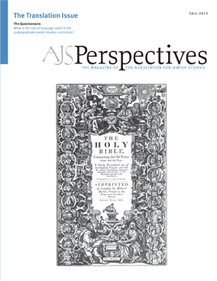Dear Colleagues,
I spent this past summer in Jerusalem, writing a report for the National Library of Israel (NLI) concerning its holdings in American Jewish Studies. I was not alone. Lots of AJS members seem to spend portions of their summer at the National Library. Some first knew it as the Jewish National and University Library, part of the Hebrew University, but since 2008 it has become a government-recognized semi-independent institution, eventually to be housed in a new stateof- the-art building near the Knesset. In the interim, the library's fabled Judaica Reading Room remains where it was, filled with scholars from around the world devotedly engaged in research. What is it about the NLI that makes it so alluring? First and foremost, of course, the size and depth of the collection draw scholars to it. The Judaica collection is especially comprehensive, embracing works not only in Hebrew and English, but in all major languages. While there are rival collections across North America, most of them, like the collection at my university, are restricted in one way or another. The NLI, by contrast, is open to the general public. All are welcome to use it.
In addition, the Judaica Reading Room contains a large collection of books and periodicals conveniently available on nearby shelves for reference and browsing. This makes research particularly efficient. In recent years, the library has also striven to become user-friendly. The difficult-to-use order slips that patrons laboriously used to have to fill out by hand ("please write clearly," librarians implored) have been mercifully retired. Most books are now easily ordered with the click of a mouse straight from the online catalog. Ornery staff members seem to have been retired as well. The library is full of young and enthusiastic staff people, eager to be helpful.
Finally, what draws many people to the Judaica Reference Room is the fact that it is filled with a diversity of scholars from around the world. Have a question? There is always some great expert off in a corner with whom one can consult. Want to talk about an idea? There is inevitably a group of scholars eager to listen and respond— vehemently. Many a monograph owes its origins to a stimulating conversation in the NLI hallways.
The atmosphere of the Judaica Reference Room was not always as welcoming as it is today. An eye-opening pamphlet by Professor Moshe Rosman, entitled From Knowledge Culture to Discourse Culture: The Changing Mission of Judaica Libraries, recalls an earlier era when Israel's library, like so many of its counterparts around the world, was an elite haven principally reserved for scholars. Cultural "philistines," were effectively barred, Rosman writes. "Only someone who had acquired the requisite cultural key, only a member of the club, only a worker of good standing in the scholarly union, could walk through." Today, research at the Judaica Reference Room and throughout the NLI has been thoroughly democratized. The library is open to all, and—much like the Library of Congress—it offers patrons a great many resources online.
The new NLI mission statement reflects this transformed ethos: In addition to collection and preservation, the NLI seeks to become the country's flagship of state-of-the-art information technology, offering open, democratic access to the vast world of physical and digital resources, tools, and services, not only those based on the Library's own holdings and trained personnel but also the almost limitless resources available through collaborative arrangements with other libraries and repositories of knowledge. The key phrase is "open, democratic access." Sitting in the NLI, I could not help but contrast this pledge with the reality of most Jewish libraries across North America. Instead of being freely open to all, most of our libraries are closed to outsiders. Even if they extend "library privileges"—a telling phrase—to short-term visitors with bona fide scholarly credentials, "open democratic access" is utterly alien to their mission. They cater to much more limited constituencies and expect outsiders who seek regular access to their collections to pay handsomely for the "privilege."
The field of Jewish Studies suffers from the fact that so many great Jewish libraries are closed to outsiders. Graduate students, emeriti, and independent scholars suffer the most, but even many of our members with regular academic appointments lack regular access to first-class Jewish library collections. The premier collections of Jewish books in North America—a few notable exceptions notwithstanding, including the Center for Jewish History—effectively lie behind paywalls. The high cost of maintaining a comprehensive Judaica collection, complex rules set by suppliers of library content like ProQuest and EBSCO, and long traditions of academic elitism ("Philistines are barred") make it unlikely that a modern-day Joshua will tear these walls down anytime soon. If anything, the walls are growing higher and higher. Some libraries, in recent years, have gone so far as to place even their online catalogues behind paywalls.
In light of these unhappy trends, the move to "open democratic access" adopted by the National Library of Israel bears careful watching. Will it promote learning, scholarship, and a more democratic ethos? Will it transform NLI into the central library for Jews and students of Judaism around the world? Should AJS partner in some way with NLI for the benefit of our members? Judging from the crowds in the Judaica Reference Room this summer, a great many library patrons, AJS members among them, have already voted with their feet.
Jonathan D. Sarna
Brandeis University

